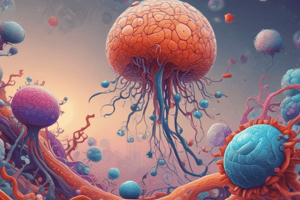Podcast
Questions and Answers
What is the primary function of the nucleus?
What is the primary function of the nucleus?
- Generating energy for the cell
- Synthesizing proteins
- Transporting molecules
- Regulating gene expression (correct)
What is the process of converting energy and nutrients into the components that make up a cell?
What is the process of converting energy and nutrients into the components that make up a cell?
- Transportation
- Protein Synthesis
- Cell Division
- Metabolism (correct)
Which organelle is responsible for cellular digestion and recycling?
Which organelle is responsible for cellular digestion and recycling?
- Mitochondria
- Golgi Apparatus
- Endoplasmic Reticulum
- Lysosomes (correct)
What is the ability of a cell to maintain a stable internal environment despite changes in the external environment?
What is the ability of a cell to maintain a stable internal environment despite changes in the external environment?
What is the process of cells communicating with each other through signaling pathways?
What is the process of cells communicating with each other through signaling pathways?
Which organelle is the site of protein synthesis?
Which organelle is the site of protein synthesis?
Flashcards are hidden until you start studying
Study Notes
Cell Function Overview
Cell function refers to the various activities and processes that take place within a cell to maintain its survival, growth, and response to its environment.
Cellular Processes
- Metabolism: the process of converting energy and nutrients into the components that make up a cell
- Protein Synthesis: the process of creating proteins, which are essential for cellular structure and function
- Cell Division: the process of a cell dividing into two daughter cells, including mitosis and meiosis
- Cell Signaling: the process of cells communicating with each other through signaling pathways
- Transportation: the movement of molecules and ions into and out of the cell
Cell Functions by Organelle
- Nucleus: contains genetic material, regulates gene expression
- Mitochondria: generates energy for the cell through cellular respiration
- Endoplasmic Reticulum (ER): involved in protein synthesis, transport, and modification
- Ribosomes: site of protein synthesis
- Lysosomes: responsible for cellular digestion and recycling
- Golgi Apparatus: involved in protein modification and transport
- Plasma Membrane: regulates the movement of molecules into and out of the cell
Cellular Responses
- Homeostasis: the ability of a cell to maintain a stable internal environment despite changes in the external environment
- Adaptation: the ability of a cell to change its structure or function in response to changes in the environment
- Cellular Defense: the cell's ability to defend itself against pathogens, toxins, and other harmful substances
Cell Function Overview
- Cell function refers to the various activities and processes that take place within a cell to maintain its survival, growth, and response to its environment.
Cellular Processes
- Metabolism involves converting energy and nutrients into cellular components.
- Protein synthesis is the process of creating proteins essential for cellular structure and function.
- Cell division involves a cell dividing into two daughter cells through mitosis and meiosis.
- Cell signaling enables cells to communicate with each other through signaling pathways.
- Transportation involves the movement of molecules and ions into and out of the cell.
Cell Functions by Organelle
Nucleus
- Contains genetic material and regulates gene expression.
Mitochondria
- Generates energy for the cell through cellular respiration.
Endoplasmic Reticulum (ER)
- Involved in protein synthesis, transport, and modification.
Ribosomes
- Site of protein synthesis.
Lysosomes
- Responsible for cellular digestion and recycling.
Golgi Apparatus
- Involved in protein modification and transport.
Plasma Membrane
- Regulates the movement of molecules into and out of the cell.
Cellular Responses
- Homeostasis is the ability of a cell to maintain a stable internal environment despite external changes.
- Adaptation is the ability of a cell to change its structure or function in response to environmental changes.
- Cellular defense is the cell's ability to defend itself against pathogens, toxins, and other harmful substances.
Studying That Suits You
Use AI to generate personalized quizzes and flashcards to suit your learning preferences.




